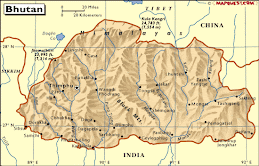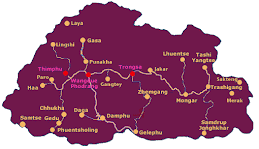
Thanks
On behalf of the Tarayana Foundation and the Tara-thon team, we would like to thank all those who donated to the Tarayana Scholarship Endowment Fund from Bhutan, England and Canada. At the time of writing, we estimate that the Tara-thon project has raised close to 700, 000 ngultrum (approximately US$17, 500). Given that about 2000 ngultrum (US$50) is needed to give a child the chance to go to school, your generous donations will give 350 kids from disadvantaged families a start in education. We are most grateful to you.
Tony Robinson-Smith & Nadya Ladouceur
Project Leaders
Day 35: Royal Reception
24 January 2008. Two police motorbikes and the blue and white twenty-one seater Tara-thon bus, red flag strapped to the wing mirror flapping, lead the way from Simtokha to Thimphu, the last leg of our Tara-thon. The bus has ‘Slow down, runners behind’ written in large black letters on a white banner covering the radiator. Behind, thirty-four runners in white Tarayana T-shirts sprint or limp the seven kilometres. The twelve of us who have run the 563 kilometres from Sherubtse College in the east to Simtokha (where university headquarters is) have been joined by twenty-two who have walked and run sixty-three from Paro (where the kingdom’s only airport is) – a branch of the Tara-thon joining us for the final day. It is not the rowdy, traffic-halting sea of joggers I had pictured in dreams. I had expected hundreds after inviting the nation on Kuzoo 105 FM, but recent bomb blasts around the country may have deterred crowds or else the Bhutanese don’t really like running.
In double-file, we jog over the Thimphu River, Nadya and I bringing up the rear. Policemen wave us into the town square. Dignitaries are in a semicircle clapping, Her Majesty Ashi Dorji Wangmo Wangchuck, eldest of Bhutan’s four queens and president of the Tarayana Foundation, at the centre. She is flanked by Her Royal Highness Ashi Sonam Dechen, several government ministers, the Indian ambassador, the deputy head of UNDP, representatives from the Royal University of Bhutan and Nancy Strickland from the Canadian Cooperation Office. Her Majesty is resplendent in richly patterned kira and red tago(jacket)with blue sleeves. We shake her hand nervously and bow to receive tashi khaddar (white silk scarf). She thanks us for organizing the Tara-thon, hopes it will set an example for other fund-raising projects. We follow her into the Druk Hotel, Thimphu’s finest, to give speeches and hand over the box of money collected. It could accommodate a microwave oven and I make the mistake of trying to hand it to the queen. Fortunately, the programme director from Tarayana intercepts it.
I feel elated, but rather odd standing with Her Majesty for the official photograph in my sweaty T-shirt, dusty Ron Hill running tights and dirty sneakers, salt-lined baseball cap clasped in my hands. The photo is taken against a black marble wall decorated with a gold Thunder Dragon, symbol of this little Himalayan kingdom.
Tony Robinson-Smith
Project Leader
Day 32: Bus Stop
The road to Dochu-la, the fifth and final mountain pass, is wide and carries twice the traffic we’re used to. It’s mainly orange or white Tata or Eicher dump trucks, transporting sand from Punatshang River to Thimphu for construction projects. Two thousand and eight is a big year for Bhutan: celebration of a hundred years of monarchy, coronation of the fifth king, the year the kingdom becomes a parliamentary democracy - reasons for international attention. Lots of visitors are expected. The capital city is getting a facelift: new houses, roads, sports stadium, market, hotels. Loaded trucks, sometimes in strings of three, grind slowly past us every four or five minutes, blasting out black fumes and kicking up dust. We round bends cautiously lest an empty Eicher rattling down the mountain flatten us. It’s hard enough puffing and panting up 21 kilometres after a month of daily half-marathons. I try and ignore the traffic, appreciate again the forest-sheltered, sunlight-dappled road with little bridges crossing streams, the cascades of feathery ferns, the villages with bar-cum-restaurants decorated with phalluses. I see Dalay Monastery, an eagle’s nest of white buildings stuck to the green ridge opposite.
After three hours, we jog into Menchhunang for the night. The spot seems pleasant, a good place to camp with flat grass around a square chorten below the road, cypress trees and a lone hut beside a stream above. There’s a boy selling bags of peanuts to passing cars. The students unpack the bus, spread our gear out over the grass, begin to erect the tents and make a fireplace. I buy some nuts and dig out soap, flannel and towel, strip down for my usual post-run wash. The boy watches me in surprise. I notice there’s a lot more litter about than usual: stamped-on juice cartons, empty plastic bottles, sweet wrappers, tissue paper. As I peel off my sweaty socks, I look down at the torn page of a newspaper. “God is no stern judge of human behaviour, but is ‘on our side’. He wants us to advance spiritually and forever forgives us when we err.” The article belongs to a section entitled ‘Mind, Body, Spirit and You', probably from 'The Times of India.' “In the Bhagavad Gita, Krishna offers this supreme encouragement to all humanity: ‘Even the worst of sinners can, with the raft of wisdom, cross safely over the ocean of delusion’ (Verse 4:36).” A bus screeches to a halt behind ours and disgorges twenty people – most of them women. Hiking up their kiras, they sprint through our campsite and into the bushes. I hurriedly put my shirt back on and zip up my toilet bag, check the whereabouts of my wallet. Splattering sounds, groans of relief. After a few minutes, a man emerges grinning broadly and adjusting the belt around his gho. He saunters back to the bus, inspecting on his way the different tent designs. He reaches down and squeezes a rolled-up foam sleeping mat. He’s walking funny – something isn’t quite right under his gho. Others join him, point at items of interest and make comments.
After twenty minutes, the passengers climb back on their bus, chatting enthusiastically, staring out the windows at us and waving. The bus leaves in a plume of exhaust. Peace is restored. “God is not blind. He sees the faults as well as the virtues and accepts us for all that we are; our follies and victories included, says Swami Kriyananda.” I open my toilet bag and get out my mirror, begin inspecting my nose, which has been peeling. Follies and victories. We’re at the Thimphu-Wangdi midway piss-stop, but tomorrow we will be eighteen kilometres higher and circling 108 chortens at the kingdom’s most splendid highway pass. Another bus marked Pelyab Transport pulls in, the doors burst open. Seven giggling teenage monks dash for the bushes followed by two Indian women, a mother and daughter, in saris; then a young man with a sullen face and slicked-back hair, a party of schoolchildren. I gather up my belongings, shove them in our tent, sigh and look ahead to the new day – the Tara-thonners’ last climb.
Tony Robinson-Smith
Project Leader


